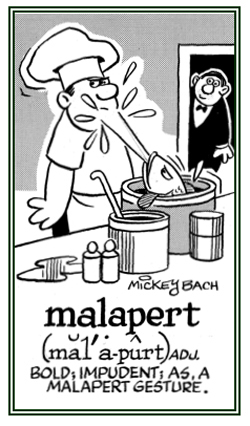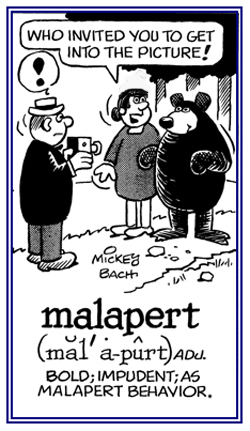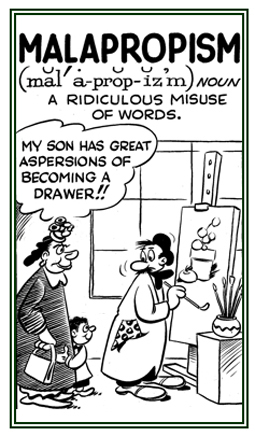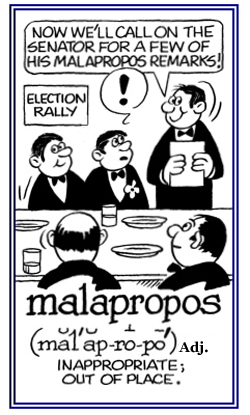mal-, male-, mali-
(Latin: bad, badly, harsh, wrong; ill; evil; abnormal, defective; used primarily as a prefix)
This combining form has no etymological connection to "male", meaning "man" or "masculine"; despite what some women may think.
2. Etymology: from Latin malus-, "bad, badly" + Middle English apert, "open, frank" which came from Latin apertus, "open"; a description of a person, or something, which is "open" or "honest" in "a bad way" resulting in "not being polite nor respectful".


Go to this Word A Day Revisited Index
so you can see more of Mickey Bach's cartoons.
An example of a malaprop was a cartoon in which a character says that a fully grown horse years ago was a little hoarse.
Examples of words that the cousin malaproped: "I regret that my affluence (influence) over my son is very small."
"Sure, if I reprehend (apprehend) anything in this world it is the use of my oracular (vernacular) tongue, and a nice derangement (arrangement) of epitaphs! (epithets!)"
A radio psychologist was heard to say, "If everybody does their job, they will be happier."
Why can't people realize that "everybody" is singular and so should take a singular pronoun reference (his/her) instead of "their"? The same is true for "everyone"! Why not say: "If everyone does his or her job then he or she will be happier."
2. The unintentional misuse of words by confusing them with other elements of speech or writing by using similar pronunciations: Joe expressed a malapropism when he told his friends that he was not under the "affluence" of alcohol.
Go to this Word A Day Revisited Index
What the mother in the cartoon meant to say is aspirations (ardently desiring); NOT aspersions (attack a person's reputation or good name)!
Is it possible that she also wanted to say that her son wants to be an artist instead of a drawer?

Go to this Word A Day Revisited Index
so you can see more of Mickey Bach's cartoons.
Malaria produces severe fever and, in some cases, complications that affect the kidneys, liver, brain, blood, and can even cause death.
There is a "short history" about malaria which is
informative and made more interesting with illustrations.
There is also another "informative description"
about those who discovered the real causes of malaria.
Other malarial symptoms include vomiting, diarrhea, coughing, and yellowing of the skin and the eyes (jaundice).
Inter-related cross references, directly or indirectly, involving word units meaning "bad, wrong": caco-, kako-; dys-; mis-; pessim-; sceler-.


